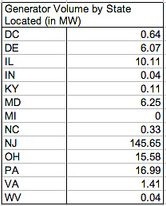 On January 8, 2013 B20-0057 , the “Community Renewable Energy Act of 2013” was introduced. The bill has 8 sponsors (Alexander, Barry, Bonds, Cheh, Graham, Grosso, McDuffie, and Wells), a majority of the 13-member DC Council. The “Community Renewable Energy Act of 2013” proposes to amend the “Retail Electric Competition and Consumer Protection Act of 1999” (which created net metering in Washington, DC) to allow rate payers in DC to “subscribe” to electricity from solar power produced from registered “Community Energy Generating Facilities.” If passed, this bill would open up the solar electricity market in DC to the entire rate payer base (including renters and condo owners) and not just property owners. Theoretically, legislation of this nature would also lower the investment risk of going solar in the District for “subscribers” and project developers by diversifying the required type and commitment of investors able to participate.
On January 8, 2013 B20-0057 , the “Community Renewable Energy Act of 2013” was introduced. The bill has 8 sponsors (Alexander, Barry, Bonds, Cheh, Graham, Grosso, McDuffie, and Wells), a majority of the 13-member DC Council. The “Community Renewable Energy Act of 2013” proposes to amend the “Retail Electric Competition and Consumer Protection Act of 1999” (which created net metering in Washington, DC) to allow rate payers in DC to “subscribe” to electricity from solar power produced from registered “Community Energy Generating Facilities.” If passed, this bill would open up the solar electricity market in DC to the entire rate payer base (including renters and condo owners) and not just property owners. Theoretically, legislation of this nature would also lower the investment risk of going solar in the District for “subscribers” and project developers by diversifying the required type and commitment of investors able to participate.
The bill must next progress to committee before it can be voted on by the general council. SRECTrade will track the progress of the legislation and provide updates as applicable. View the proposed bill here.
Some interesting clauses to note in the proposed bill:
– “Community Energy Generating Facilities” cannot be larger than 5 MW in capacity
– There can be as few as 2 subscribers to the power produced from eligible facilities
– Subscriptions cannot be for more than 120% of the subscriber’s 12 month electricity usage
– Subscriber accounts can only be adjusted once a month
– Utilities (Pepco) may be able to require all subscribers to be on the same billing cycle
– The owner(s) of the Community Energy Generating Facility owns the rights to SRECs produced from the power
– Power production will be tracked by a production meter installed by the Community Energy Generating Facility owner
– In months where subscribers receive credit for more power than they consume the excess power will be credited towards the next month’s electric bill
– Excess power credits at the end of the annual cycle (ends in April of each year) will be lost and reallocated to rate payers eligible for the District’s Low Income Housing Energy Assistance Program (LIHEAP)
– Requires adoption of the Interstate Renewable Energy Council (IREC) interconnection standards within 6 months of the bill’s passage.
– Most interestingly, the proposed bill requires that the District Department of Energy and the District Sustainable Energy Utility to develop a proposal within 6 months of the bill’s passage for an equitable and creative program for financing community net metering projects.
Tweet

